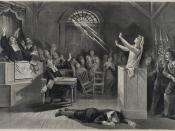Colonial America was bursting with changes throughout the late 17th century and into the early 18th century. A new time era known as "The Enlightenment" came about which brought many advances in medicine, science, botany, and education. Also, the "Great Awakening", a time of great religious revival flourished. A well known event, the Salem Witch Trials were known as an essential turning point in history. It showed how religion and government changed through history. British America became a more stable environment with mixed results due to these turning points.
"The Enlightenment" was a period known for many advances. Disease was still strong, and Cotton Mather and Zabdiel Boylston are credited for the first inoculation of any kind. The Enlightenment inspired new technology. Scientific advancement was by far the most interesting. Sir Isaac Newton is acknowledged with his theory of gravity and John Locke was accredited for noting the fact that knowledge is gained by experience.
Up until these theories had been proved many people believed that spiritual Gods controlled their destiny. Advancement in education improved also, with many schools and colleges being formed. Studies of botany and plant life helped with crop growth and supported families. Many individual began medical training and surgery practices were proving to be safer than in the past.
Religion was known to vary greatly between cultural groups. The Great Awakening was a wave of religious revivals. It quickly swept thru New England and increased conversions and church memberships. It was once believed that life was predestined by God, but the happenings of the Great Awakening ended that notion. The movement shattered the existing church structure of the colonies, as congregations wakened to the teaching style or revivalist, or New Light, ministries. There views were liberal, explaining the consequences of leading a "bad life".



Salem
This reads very well and I like the way you have contrasted events which really throws into relief the terrible happenings in Salem.
2 out of 2 people found this comment useful.